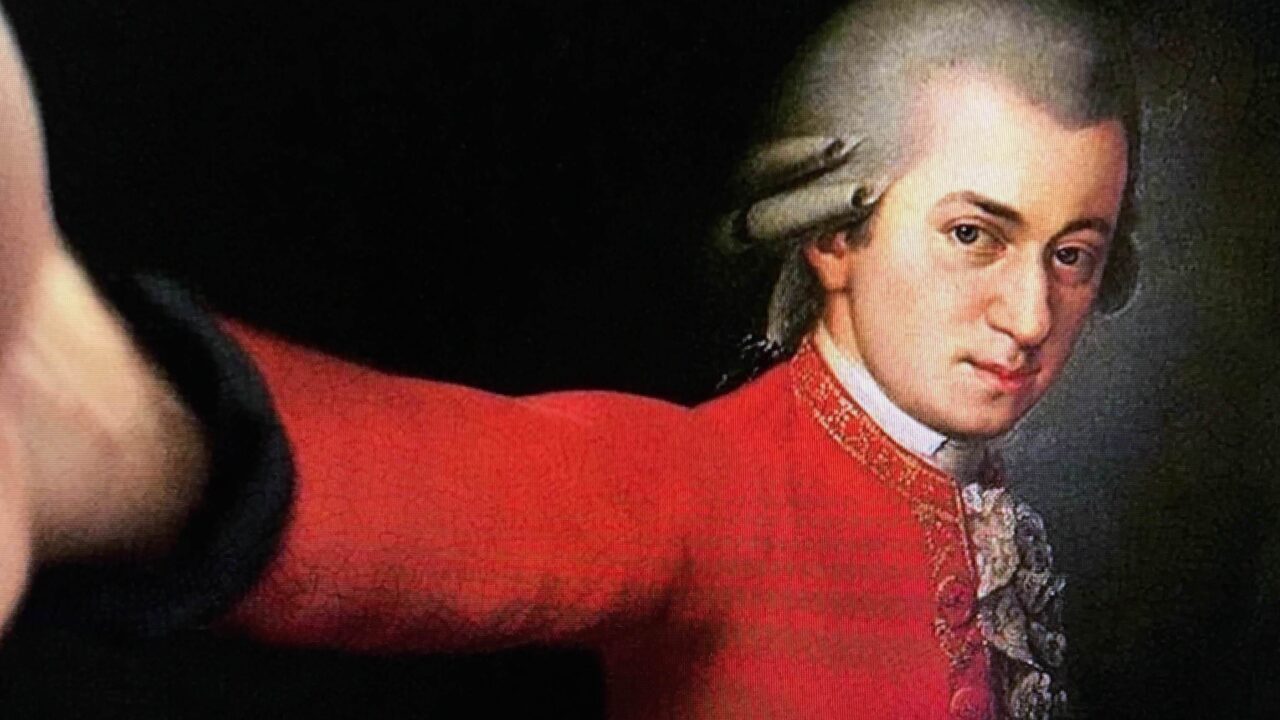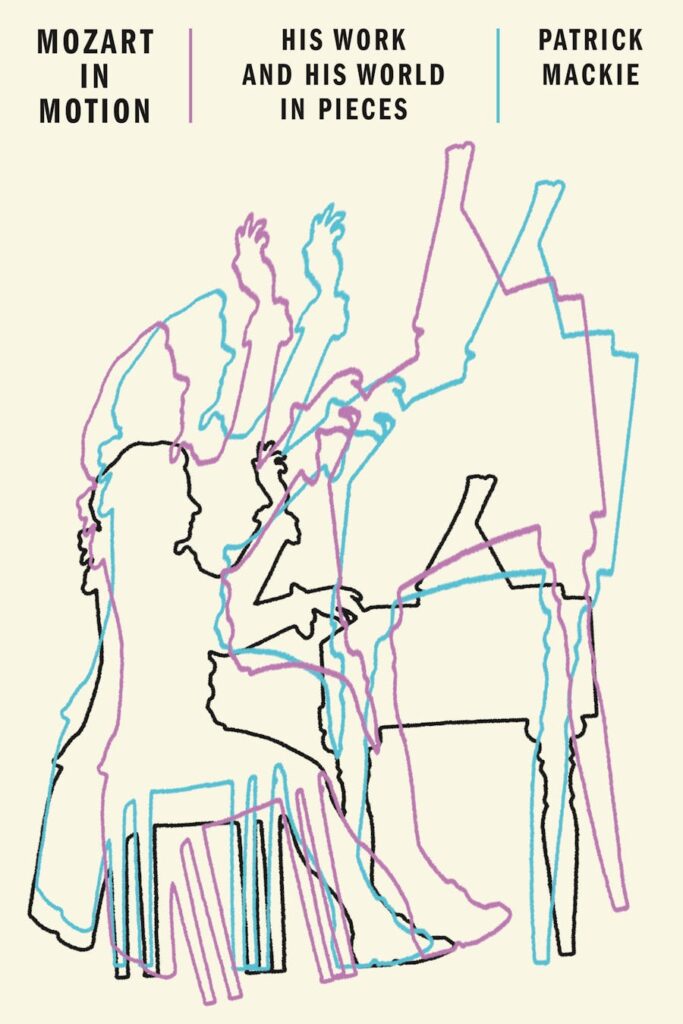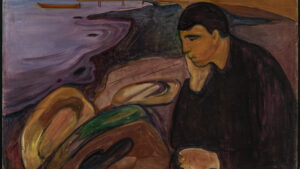Portraying Mozart in His Time
Opera fans will enjoy Patrick Mackie's close reading of the composer's final years. Image via Imgur
Image via Imgur
Mozart in Motion: His Work and His World in Pieces
by Patrick Mackie
(Farrar, Straus, Giroux, pub date: June 6, 2023)
Mozart weaves human frailties into such noble forms that critics lean on superlatives when describing “The Marriage of Figaro” or his “Jupiter” Symphony. His music achieves a “purity and beauty that one feels he merely found it,” wrote G.B. Shaw, “that it has always existed as part of the inner beauty of the universe, waiting to be revealed.” To his late 18th century audience, Mozart conveyed an acute sense of how life felt on the verge of modernity, when Enlightenment ideas found traction, America cast off British rule, the French Revolution shook the aristocracy and the Hapsburg ruler Joseph II kept changing his mind about what kinds of freedoms he might tolerate.
In “Mozart in Motion,” the British cultural critic Patrick Mackie details the final chapter of the composer’s life by explaining how he both captured and broke free from his era’s values. Mackie’s prose gathers momentum by tackling the music’s rich contradictions. He has a flair for aphorisms (“We sometimes become different versions of ourselves when we listen to music…”), and frequently drops thought-bombs that, upon explosion, set off wider reverberations (“Was Mozart ever liable to feel a need to be forgiven for his own mastery?”).
If Mackie’s voice flirts with pretense, a close reading reveals keen ears and a lively imagination, especially for opera fans. He’s particularly insightful when discussing Mozart and forgiveness. The narrative builds toward some fine writing on the late, unfinished “Requiem” that could serve as another kind of headstone. Much of this writing chases music that transcends beauty for beauty’s sake and strikes upon wisdom both humane and inscrutable, a sagacity at once poised and playful. Straddling musicology with historical grounding, “Mozart in Motion” reaches to touch the hem of Mozart’s garment.
Mozart’s third and final decade in Vienna’s 1780s saw him move from the provincial city of Salzburg, separate from his overbearing father and marry at 26, all the while writing down his galloping thoughts in weekly letters to family and intimates. Here’s Mackie’s discursive thumbnail: “The most vivid account that we have of what ensued must originate from [Mozart’s wife] Constanze herself, the younger sister of Aloysia whom the composer would marry a few years later and whose second husband would become his biographer many years in the future.” There you have the tangled contingencies alive in how historians hear Mozart; his music springs not from providence but from a particular set of cozy affections, social circles and bewigged interests.
If Mackie’s voice flirts with pretense, a close reading reveals keen ears and a lively imagination, especially for opera fans.
Mozart’s missives gleam amid late 18th century letters as portals into the tough and sometimes petty personality behind the composer’s elegant arias. But the closer you listen, the more this utterly human subtext enhances his stature. He mastered the sonata form and the many courtly (read: political) values his patrons and listeners embraced, but nevertheless laced his pieces with rakish whimsy and elegant coquetry that disrupted every expectation. Mozart, a dissident posing as an aristocrat, always found beauty complicated, fraught with self-contradiction. In Mackie’s words: “One reason to keep calling Mozart a classical composer in the widest sense is that his flights and expansions keep arching back towards comprehensiveness and coherence.”
The montage of Leopold touring his virtuoso wunderkind around Europe’s courts has a B-movie feel about it, especially since Mozart matured quickly into both a performer and composer of note among patrons who mattered. This father-son relationship permeates Mozart’s scores like “Don Giovanni,” and can’t explain why Mozart spent most of his life freelancing on the fringes of stability. At one point, Mackie writes, “Reading his letters, we encounter someone addicted to the dazzling first impressions that he can keep making on precessions of audiences and grandees, but who cannot relish the grind of enduring commitments.” As he comes of age, duty and rebellion fuse with Mozart’s leaping gift to see an artist who embraces the joy of craft even as it wrestles with obligation.
In Salzburg, Mozart soon outgrew his milieu by writing five Violin Concertos, summarized by Mackie in this way:
“To himself even more than to others, he must have seemed both a consummate insider in the place and someone already far outside it. In these concertos we hear precisely the psychic and artistic work required to sustain such a double attitude, to remain the masterful denizen of a little cultural domain while also straining dazzlingly to reach beyond it.”
These deft summaries appear so often that Mackie risks repeating himself, as he ties plump statements to works that could prove interchangeable. Sometimes his language approximates the music’s fetch and exuberance: “He could move between the slightest charm and the densest rapture, or between the most vulgar goofiness or obscenity and the sheerest technical prowess, in just a breath or two…” Many of these precise descriptions reveal new shades of the uncanny in Mozart’s phrasing.
“In these concertos we hear precisely the psychic and artistic work required to sustain such a double attitude, to remain the masterful denizen of a little cultural domain while also straining dazzlingly to reach beyond it.”
Once settled in Vienna in 1781, Mozart half expected to leap triumphal hurdles and find international renown, only to discover that court intrigue and public clamor were all the more grating and insubstantial, where listeners preferred serenades to symphonies, light conversation music and dance to serious listening and steady work never quite aligned with his artistic fancy. “Being praised had been a way of life for Mozart for a long time before the move to Vienna,” Mackie writes, “and his work often sounds pleased by the praise that it is about to receive. So too this must have brought him sooner rather than later to some unusually high realism in assessing the meaning of praise.” Almost two centuries later, in “Idiot Wind,” Bob Dylan could have been singing about Mozart’s predicament: “You’ll find out when you reach the top/You’re on the bottom…”
The music inspires in Mackie observant phrases to capture how shrewd Mozart seems even, or perhaps especially, through humor: one piece strikes Mackie as “wildly plangent,” while another sounds “manically clandestine.” In one of his string quintets, “tenderness and vertigo join hands,” while another piece seizes a “high-temperature fusion of anarchy and restfulness.” When he’s not “bleakly vibrant,” he’s chasing a “trenchant neatness” or “adamantine silkiness,” with a “craggy grandeur” that can seem “drastically pleasant.”
Mackie’s axioms, too, ring out with the “magnificent casualness”:
- “Excellence is not enough any more than being praised is enough.”
- “Eighteenth-century Europe never knew whether it wanted to be dazzlingly new or imperiously old.”
- “In Kant the European mind was making its great effort to hold itself together, but the strain of the attempt is part of the texture of his thought.”
- “Sometimes Mozart’s music seems so rational as to be all but abstruse, but it thus also suggests how weird rationality is in the first place.”
And while Mackie avoids musical terms, he describes Mozart’s compositional practice better than some musicologists: “A phrase will turn up in a different guise as a piece develops, and, as with the gags in a good stand-up routine, its second appearance will rearrange the suppositions that it had previously set up, revealing a wider, perhaps more surreptitious logic that has in fact been in place from the beginning…”
Mackie excels when analyzing the operatic collaborations Mozart enjoyed with Lorenzo da Ponte and Emanuel Schikaneder, and reaches a gravid description of Johann Wolfgang Goethe’s 1774 novel “The Sorrows of Young Werther,” and how its young hero seized the public mind during Mozart’s adolescence, climaxing with Napoleon’s lusting obsession. As a survey of Mozart’s totems, Mackie challenges received ideas and offers descriptions that may yet prove worthy of his subject. All the while, Mozart hovers just out of reach, an artist who answered political unrest with spiritual grace.
Your support matters…Independent journalism is under threat and overshadowed by heavily funded mainstream media.
You can help level the playing field. Become a member.
Your tax-deductible contribution keeps us digging beneath the headlines to give you thought-provoking, investigative reporting and analysis that unearths what's really happening- without compromise.
Give today to support our courageous, independent journalists.










You need to be a supporter to comment.
There are currently no responses to this article.
Be the first to respond.